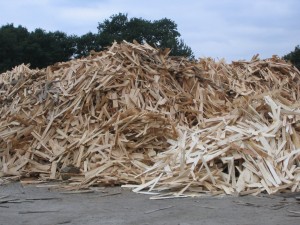The Environment Agency Regulatory Position Statement on waste wood – need to know information
 Changes are afoot with regards using waste wood in RHI accredited biomass boilers. The Environment Agency (EA) has just released a Regulatory Position Statement affecting anyone who produces, transports, stores, processes, trades, uses (including burning it in boiler) or disposes of waste wood.
Changes are afoot with regards using waste wood in RHI accredited biomass boilers. The Environment Agency (EA) has just released a Regulatory Position Statement affecting anyone who produces, transports, stores, processes, trades, uses (including burning it in boiler) or disposes of waste wood.
The crucial change for traders and users of waste wood for biomass is that only clean, untreated pre-consumer waste wood can be legitimately used in a non- Waste Incineration Directive (WID) boilers. All post-consumer waste irrespective of whether it is untreated (e.g. Grade A and B) or not will automatically be classified as hazardous material. These changes are effective immediately and will have major implications for RHI participants which are summarised in the table below.
| Current fuel | Supplier has provenance (Y/N) | Options | Implications of this |
|---|---|---|---|
| Untreated pre consumer waste wood (Grade A or Grade B) e.g. Joinery waste | Yes | Supplier must have a permit or exemption to store and process the waste wood; make sure material has a European Waste Code and a waste transfer note; must have a waste carrier licence if they transport the waste wood fuel to the customer; must check that the customer has the correct permit or exemption to burn this fuel (this still applies if the customer burning the fuel is themselves i.e. self-supply). End users will need to self report to Ofgem against the sustainability criteria. | All this additional paperwork is bureaucratic and time consuming and will almost certainly make waste wood with a provenance more expensive. Self reporting is more onerous and costly than going through the BSL. |
| No | If the supplier does not have provenance then the waste wood is categorised as hazardous waste which means that the pathways below need to be followed. | This source of waste wood can longer be sold as Grade A or B or legitimately used in RHI systems that are not WID compliant. This is effective immediately. | |
| Post consumer waste (Grade A or Grade B) e.g. pallets, construction wood | No | Replace the existing boiler with a Waste Incineration Directive (WID) compliant boiler | This will mean selling on the boiler and the RHI tariff that comes with the boiler to a third party (there are people offering to buy boilers in this way and resite them). WID compliant boilers are expensive and more than likely will come with a far lower RHI tariff. |
| No | Replace waste wood fuel with UK sourced virgin round wood chip | The cost of virgin round wood chip is much more expensive than waste wood. This will seriously effect the potential payback from a RHI supported system. | |
| No | Replace waste wood fuel with UK sourced Short Rotation Coppice wood chip (or an SRC/virgin blend) | More expensive than waste wood but less expensive than round wood chip. There are some quality and emissions issues associated with SRC chip (but not nearly so many as when using waste wood). Blended fuels significantly reduce these issues. Supply is limited to certain regions (mainly Yorkshire, East Midlands, Cumbria) | |
| No | Replace waste wood fuel with imported virgin round wood chip | The cost of virgin round wood chip is more expensive than waste wood. This will seriously effect the payback from a RHI supported system. Furthermore, although it would still meet sustainability requirements lifecycle GHG emissions will be higher and there is less financial benefit to the UK biomass sector. | |
| No | Replace waste wood fuel with UK sourced non wood fuels | Cheapest alternative to waste wood. Many boilers that can burn waste wood will be compatible with these fuels. There are some quality and emissions issues associated with non wood fuels (but not nearly so many as when using waste wood). Users need to make sure they have an appropriate RHI emissions certificate that meets thresholds for NOx and particulates with their chosen fuel and boiler. | |
| No | Replace waste wood fuel with imported non wood fuels e.g. sunflower husk pellets, olive meal pellets | Cheaper alternative to waste wood. Many boilers that can burn waste wood will be compatible with these fuels. There are some quality and emissions issues associated with non wood fuels (but not nearly so many as when using waste wood). Although in most cases these will meet sustainability requirements lifecycle GHG emissions will be higher and there is less financial benefit to the UK biomass sector. Users need to make sure they have an appropriate RHI emissions certificate that meets thresholds for NOx and particulates with their chosen fuel and boiler. |
Guidance on this change to the regulations is expected imminently from the Biomass Suppliers List (BSL).
If you are trading waste wood or using waste wood in your biomass system please give us a call so we can discuss your options for:
- Getting the necessary paperwork in order
- Changing your boiler
- Modifying your system, or
- Changing your fuel
C4E and our expert affiliates can help you take all the necessary steps to achieving compliance and make sure you keep getting uninterrupted RHI payments.
Please call C4E in the first instance on 0117 9089057 or contact us.